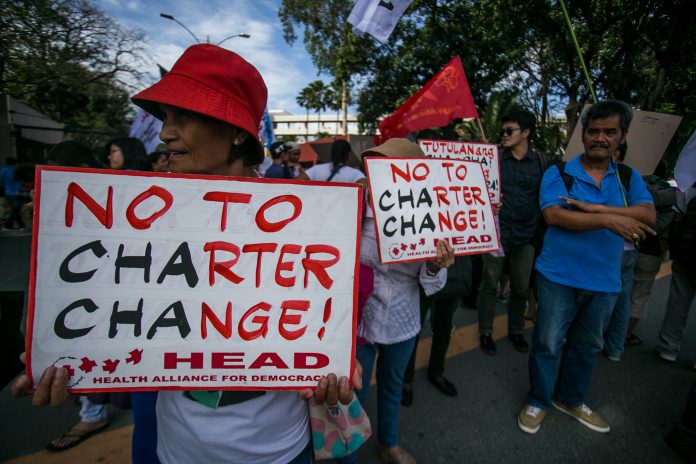Can we trust politicians—those already immensely enjoying the power, pelf and privilege that goes with public office and those shamelessly lusting after the spoils of high leadership position— to at least respect the suffering, hardship and grief the entire nation is going through with COVID-19?
Apparently not.
While everyone was busy complying with lockdown restrictions due to the coronavirus outbreak, the Interior department has apparently been stealthily doing an overtly political act: gathering two million signatures to change the 1987 Constitution and shift from a unitary to a federal system of government.
Federalism via Charter change has been a key proposal of the Duterte administration since Day One in 2016.
As far back as two years ago, amid talk about Charter change and federalism, the Catholic Bishops’ Conference of the Philippines (CBCP) had already issued a strong statement expressing doubts that the Duterte administration’s move to revise the 1987 Constitution to shift to the federal system would result in the “attainment of the common good.”
Amid “widespread poverty, inequality, and violence in our country,” the statement said, “amending the fundamental law of the land, so carefully crafted for the common good after years of dictatorship, requires widespread peoples’ participation and consultation, unity of vision, transparency, and relative serenity that allows for rational discussion and debate.”
The prelates suggested that “if the Constitution is to be revised at all, the process should lead to a greater defense and promotion of the moral values of human dignity and human rights, integrity and truth, participation and solidarity, and the common good.”
The statement was signed by Archbishop Romulo G. Valles of Davao, CBCP president.
For his part, Bishop Broderick Pabillo, now the Apostolic Administrator of the Archdiocese of Manila, is among those who believe that the Duterte administration’s push to change the 1987 Constitution to effect the shift to a federal system needs to be studied very carefully.
“We cannot be good Christians without being good citizens,” he said earlier. Filipinos, he pointed out, should instead work to ensure that safeguards on human rights and social justice enshrined in the 1987 Constitution “should not be removed or changed to fit the self-serving ends of politicians.”
The Church stand against federalism is validated by a study conducted by the University of the Philippines School of Economics. It concludes that federalism is a “strong predictor” of higher income inequality in developing economies and higher poverty on average for all countries.
“The pro-federalism position claims that federalism will cause poverty to fall and the distribution of income to be more equal. Our regression results bear neither of these claims,” the economists said.
“On the contrary, federalism strongly predicts greater income inequality in developing countries. Our results also show that federalism strongly predicts higher poverty incidence and severity on average: it does not reduce poverty incidence and severity in developing economies,” they said.
Supporters of Charter change insist that federalism would accelerate economic growth as resources would be equitably distributed among the proposed 16 or so regions, or federal states.

The key argument of the federalists is that the poor regions would be able to catch up with Metro Manila and other urban areas as they would have greater control of economic resources and chart their own path towards socio-economic growth under a comprehensive national development program.
While federalism has its share of supporters, there are also critics who vigorously oppose it. They believe that promises of sustained and inclusive growth as well as poverty reduction under a federal system as economic resources are illusory as political and economic power is likely to be controlled by political dynasties.
A number of bills seeking to prohibit political dynasties have already been filed in the legislature, but have been indefinitely shelved because of intense objection from lawmakers hailing from entrenched political families.
There’s also the fear that the shift to federalism could cost a gargantuan amount running into hundreds of billions of pesos that can otherwise be used to pump-prime growth in the laggard regions.
With no ironclad guarantee that poor Filipinos would improve the quality of their lives with the change in the system of government from unitary to federal, then why insist on Charter change when all attention should be focused at this time on saving lives from the coronavirus?
Ernesto M. Hilario writes on political and social justice issues for various publications in the Philippines. The views and opinions expressed in this article are those of the author and do not necessarily reflect the official editorial position of LiCAS.news.









